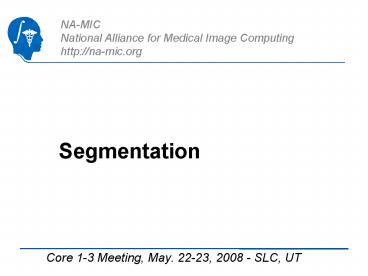Segmentation PowerPoint PPT Presentation
1 / 29
Title: Segmentation
1
Segmentation
- Core 1-3 Meeting, May. 22-23, 2008 - SLC, UT
2
Georgia Tech/JHU
Prostate Segmentation Registration Framework
Yi Gao (Georgia Tech), Allen Tannenbaum (Georgia
Tech), Gabor Fichtinger (JHU)?
3
Background
- Under the roadmap project Brachytherapy Needle
Positioning Robot Integration. - Auto/Semiauto segmentation.
- Registration
- Between modalities US/MRI
- Before/during therapy
4
Segmentation
- Two approaches
- Random Walks(RW)?
- RW post process
- Toward automatic segmentation
- Spherical wavelet shape based method
5
Random walks
- Random Walks(RW)?
- Result ?
- Less interaction
- C code
6
Shape based method
- Spherical wavelet shape based method
- Shape learning
- ITK Spherical wavelet transformation
- Shape based segmentation
7
Shape based method
- Spherical wavelet shape based method
- Shape learning
- ITK Spherical wavelet transformation
- Shape based segmentation
8
Shape learning
- Align segmented shapes.
- Registration under Similarity transform.
- Learn aligned shapes.
- Statistical learning PCA, KPCA, GPCA
9
Shape learning
- Align segmented shapes.
- Registration under Similarity transform.
- Learn aligned shapes.
- Statistical learning PCA, KPCA, GPCA
10
Registration
- Common region extraction
- Used as landmark
- Rigid/Deformable registration
- Particle filter/Kalman filter
- Optimal mass transportation
11
Landmark extraction
- Chan-Vese on manifold
- Extract featured region on surface.
- Feature defined by a function.
Color depicts a scalar function defined on a
surface.
12
Landmark extraction, cont.
13
Landmark based Registration
- Concave belly of prostate
- Common among all prostate
- Used as soft-landmark in registration.
14
UNC/MIND
Lesion Segmentation
Marcel Prastawa (Utah), Guido Gerig (Utah),
Jeremy Bockholt (MIND)?
15
(No Transcript)
16
MIND Lupus Lesion
17
Iowa/MIND
Bayesian Classification of Lupus Lesions
Vincent A. Magnotta (Iowa), Jeremy Bockholt
(MIND), Peter Pellegrino (Iowa)?
18
Algorithm Overview
- Tissue classification algorithm coupled with
lesion identification - Required Inputs
- T1, T2, and FLAIR images that have been spatially
normalized and bias field corrected - Definition of the brain
- Currently uses BRAINS Autoworkup pipeline to
fulfill these requirements
19
Algorithm
- Uses K-means classification
- Initial estimate of GM, WM, and CSF based on
minimum, mean, and standard deviation from T1
weighted image - Kmeans segmentation into GM, WM, and CSF from T1
weighted image - Lesion from FLAIR Images
- Threshold FLAIR image based on mean and standard
deviation within the brain - Eliminate lesion voxels adjacent to CSF
- Remaining lesion voxels from the Kmeans
classification are used to relabel the Kmeans
labelmap with a Lesion value
20
Bayesian Classification
- Define exemplars for classes
- Randomly sample 1000 points from GM, WM, CSF, and
Lesion labels - Used to define the means and variance for the
classes - Define class priors
- Extract each class from labelmap generated in
previous step and filter with a 2mm gaussian
filter - Run multi-modal Bayesian classifier
- T1, T2, and FLAIR images input
21
Results
22
MIT/Harvard
Tissue Classification
Kilian Pohl (MIT/BWH), Brad Davis (Kitware),
Sylvain Bouix (Harvard), Marek Kubicki (Harvard),
Martha Shenton (Harvard), Sandy Wells (BWH),
Polina Golland (MIT)?
23
Slicer 3 Module
24
EM-Segmenter
- Intensity normalization
- Structure hierarchy
- Registration
- Atlas-to-subject
- Multimodal
- Applications
- Tissue classification
- Structure parcelation
- MS lesions segmentation
25
Georgia Tech/Harvard
Label Space Segmentation
Jimi Malcolm (Georgia Tech), Allen Tannenbaum
(Georgia Tech), Yogesh Rathi (Harvard)?
26
Label Space
- Problem Constructing an anatomical model for
multiple, covarying regions - - Slice from labeled brain
- State of the art
- - Signed distance maps develop artifacts
along interface between regions, small variations
on interface cause large perturbations far away - - Binary vectors background bias during
registration - - LogOdds natural probabilistic
interpretation, but uses the above intermediate
representations thus incurring similar problems
27
Label Space
- Label Space
- - regular simplex
- - natural algebraic manipulation
- - direct probabilistic interpretation
- - unbiased toward any label
28
Label Space
- Experiments
- - smoothing, interpolation
- - registration
- - probabilistic atlases
29
Questions?

